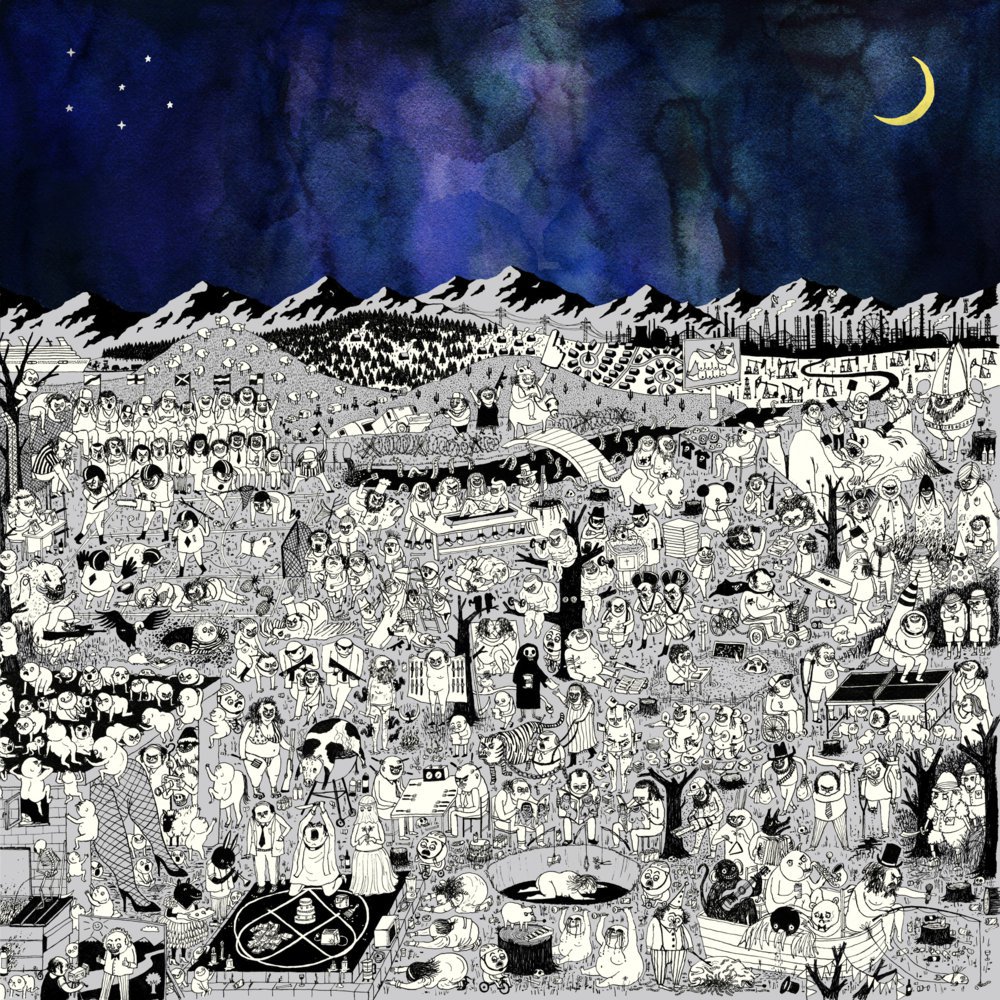Acclaimed singer-songwriter/notorious internet troll Father John Misty (Josh Tillman) has an inclination towards daring statements. His unpredictable antics are the antithesis to the intricate craft of his songwriting. Listeners everywhere, please disregard his interviews and have a listen to what he really has to say through his music. In his latest record Pure Comedy, Father John Misty finally acknowledges the weight of his persona, and makes some bold pretensions regarding our consumerist obsessions.
 His previous records as Father John Misty, 2011’s Fear Fun and 2014’s I Love You Honeybear, both sought to balance more fashionable styles of production with his adaptation of classic singer-songwriter moves. Fear Fun, with its heavy reverb and textured guitars, was his most modern and alternative sounding record. I Love You, Honeybear, explored deeper into his fascination with chamber pop and wall of sound style production, further crafting his essence. Pure Comedy is his embrace of a more straightforward sonic vision, which correlates with its lyrical content. Grand statements, grand sound, no nonsense. With its piano ballads (Ballad of the Dying Man, Two Wildly Different Perspectives) and exploratory structures (So I’m Growing Old on Magic Mountain, Leaving LA), it runs the risk of sounding too much like an attempt at Harry Nilsson, perhaps even Elton John. Thankfully though, he transmits his message so efficiently, that you can really appreciate his work for what it is, and not what it is inspired by.
His previous records as Father John Misty, 2011’s Fear Fun and 2014’s I Love You Honeybear, both sought to balance more fashionable styles of production with his adaptation of classic singer-songwriter moves. Fear Fun, with its heavy reverb and textured guitars, was his most modern and alternative sounding record. I Love You, Honeybear, explored deeper into his fascination with chamber pop and wall of sound style production, further crafting his essence. Pure Comedy is his embrace of a more straightforward sonic vision, which correlates with its lyrical content. Grand statements, grand sound, no nonsense. With its piano ballads (Ballad of the Dying Man, Two Wildly Different Perspectives) and exploratory structures (So I’m Growing Old on Magic Mountain, Leaving LA), it runs the risk of sounding too much like an attempt at Harry Nilsson, perhaps even Elton John. Thankfully though, he transmits his message so efficiently, that you can really appreciate his work for what it is, and not what it is inspired by.
Total Entertainment Forever, one of the finest and most charming moments from the album, is a sharp and refreshing reflection on where we are headed as consumers. With lyrics such as “Bedding Taylor Swift / every night inside the Oculus Rift / after mister. and the missus / finish dinner and the dishes” and “When the historians find us we’ll be in our homes / plugged into our hubs / skin and bones”, it makes this disconnected future dominated by our search for endless distractions, as narrated by Tillman, feel not so distant.
The production and arrangements here are stellar and essential to its effectiveness. Tillman’s voice resonates clearer than ever before, with his most evocative and personable statements yet. Highlights “Things It Would Have Been Helpful to Know Before The War” and “Leaving LA” are supported by dulcet orchestration, amplifying their messages. “Leaving LA” is one of the few tracks that suffers from personal overload, in which the narrative is focused more on himself than on the world. Everything else about this record feels vulnerable and intimate, for the social weight it carries is impossible to ignore. In his judgments, Tillman is blunt, yet fair and sympathetic. He knows we are insane, but he too knows we cannot help it. One cannot help but think his critiques are not just at the world, but at himself as well, for no one is exempt from mankind’s innate irrational achilles heel. Album opener and title track Pure Comedy suggests man in itself is a joke, “The only thing that seems to make them feel alive is the struggle to survive / but the only thing that they request is something to numb the pain with / until there’s nothing human left”.
Not every moment on this record is as effective as it should be. Its second half exhibits some slower moments that can drag on for longer than they should, such as its final songs So I’m Growing Old on Magic Mountain, and In Twenty Years or So. Regardless, this record is an honest statement of social chaos and how it each and every one of us participate in it. It does what seminal records do best, delivering truths both so universal and personal, without any incentive but that of expression. Not many artists can achieve that.
There is no denying the cultural relevance of this album, for worse or for better, it sincerely captures the darkness behind our modern ambitions. In its finest moments, Pure Comedy feels and sounds like a big deal, and that’s because it is. This album is a timestamp and a true contemporary work of art. It is flawed, it is confusing, it is easy to criticize, and hard to fully come to terms with, for it is ultimately human. The anxiety weaved throughout it permeates so effectively, that it is frankly hard to listen to at times. Its cynicism is beautiful in its integrity, and for this, it is a great achievement not only for Father John Misty, but for modern music as well.


You must be logged in to post a comment.